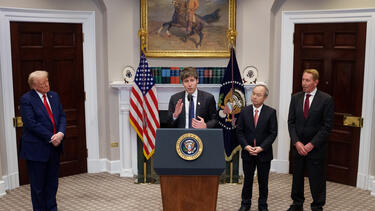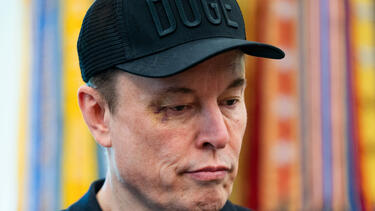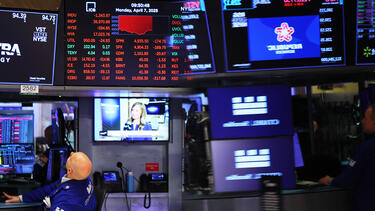Steven Tian
The President Holds the Trump Card in His Meeting with Putin. Will He Play It?
When Donald Trump meets with Vladimir Putin about the war in Ukraine this week, write Yale SOM’s Jeffrey Sonnenfeld and co-author Steven Tian, he should remember that he has a key piece of leverage: Russia’s economy is struggling, and the U.S. can push it off the cliff.

The Last Disgrace of the ‘Tiffany Network’
Yale SOM’s Jeffrey Sonnenfeld, with co-authors Steven Tian and Stephen Henriques, writes that the capitulation of CBS to the Trump administration is the final stage of a long decline for three storied brands.

Zelensky Must Protect Civil Society
Jeffrey Sonnenfeld and coauthors write that Ukrainian President Volodymyr Zelenksy’s recent moves against political rivals are self-defeating and dangerous missteps. They argue that he needs to show the courage to acknowledge mistakes and restore trust.

Tim Cook Is Still the Right Leader for Apple
Yale SOM leadership expert Jeffrey Sonnenfeld and co-author Steven Tian argue that Cook’s unmatched track record makes him uniquely positioned to steer the company into its next phase of innovation and growth.

Can Mark Zuckerberg Spend His Way to AI Success?
Meta has lured a string of top researchers from rivals with nine-figure pay packages in an effort to close the gap with AI leaders like OpenAI, Anthropic, and Google. But splashy hires rarely end up rescuing flailing enterprises, write Yale SOM leadership expert Jeffrey Sonnenfeld and co-author Steven Tian.

What Happened When Five AI Models Fact-Checked Trump
President Donald Trump is an AI booster, write Yale SOM’s Jeffrey Sonnenfeld and co-authors Stephen Henriques and Steven Tian. So they thought it was fair to ask the leading chatbots to evaluate some of Trump’s frequently repeated claims.

The Problems with a Socialist Vision for NYC
Yale’s Jeffrey Sonnenfeld and co-authors suggest that some of New York City mayoral candidate Zohram Mamdani’s socialism-inspired proposals, such as city-owned grocery stores, are likely to run into inefficiencies and unanticipated downsides. They write that capitalism can be a better engine of progress.

Are We Witnessing the Implosion of the World’s Richest Man?
Elon Musk has less leverage in his battle with Donald Trump than he thinks, Yale SOM leadership expert Jeffrey Sonnenfeld and co-author Steven Tian write. But neither of the former allies can come away from this feud with a win.

The Trump Tariffs Are Paralyzing Business Investment
Yale SOM’s Jeffrey Sonnenfeld and co-author Steven Tian write that the administration’s unpredictable approach is bringing new corporate initiatives to a standstill and pushing the economy toward recession.

CEOs Don’t Want to Return to Russia, Because They Know It’s Bad Business
Amid warming relations with Washington, Vladimir Putin is floating new opportunities for Western companies in Russia. But Yale SOM’s Jeffrey Sonnenfeld and co-author Steven Tian write that business leaders are reluctant to reengage in a dangerous setting and a faltering economy.
